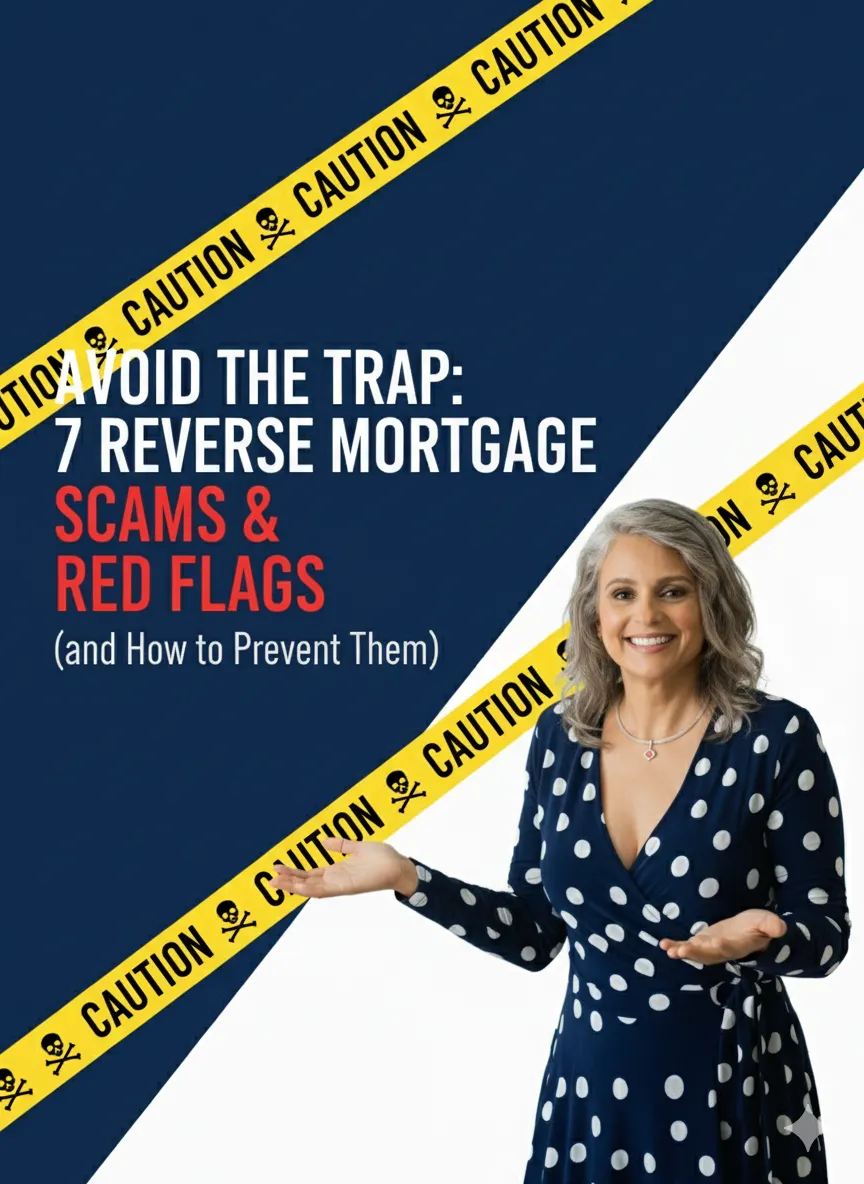
Avoid the Trap: 7 Reverse Mortgage Scams & Red Flags (and How to Prevent Them)
Why This Matters
If you’ve spent any time searching “reverse mortgage” online, you’ve probably run into scary stories. Some are legitimate warnings. Others are clickbait.
The truth is, reverse mortgages are highly regulated and can be a safe, helpful tool — but like any financial product, there are bad actors who try to take advantage of seniors. Knowing the red flags can protect you and your family.
The 7 Most Common Reverse Mortgage Scams
1. The “Too Good to Be True” Ad
If someone promises a reverse mortgage with no fees, no counseling, and instant approval, stop right there. Every federally-insured reverse mortgage (HECM) has clear rules, including required counseling.
Protect yourself: Always verify with HUD’s approved lender list before signing anything.
2. Deed Fraud
This happens when scammers trick seniors into signing over the deed to their home in exchange for false promises of “help” or “equity release.”
Protect yourself: Remember, a legitimate reverse mortgage never requires you to give up ownership. Your name stays on the title.
3. Pressure Sales Pitches
If someone tells you, “Sign today or you’ll lose your chance,” it’s a red flag. Reverse mortgages are not “flash sales.” They’re long-term financial decisions.
Protect yourself: HUD requires independent counseling before approval. Take your time and talk it through with trusted family members.
4. Contractor Kickbacks
Some scammers try to sell a reverse mortgage as a way to pay for home repairs, then overcharge for shoddy work.
Protect yourself: Choose your own contractors. Never sign a reverse mortgage with a contractor’s “preferred lender” without verifying credentials.
5. Fake Counseling Agencies
Counseling is required, but scammers sometimes pose as “free advisors” to push you toward a shady lender.
Protect yourself: Verify the counselor on the HUD website. Real counseling is independent, not tied to a specific lender.
6. Family or Caregiver Abuse
Sadly, financial exploitation sometimes happens closest to home. Adult children or caregivers may pressure seniors into getting a reverse mortgage to access the funds themselves.
Protect yourself: Always include a neutral third party — a financial planner, attorney, or HUD counselor — in the conversation.
7. “Investment Opportunity” Pitches
If someone suggests you use a reverse mortgage to fund an annuity, insurance policy, or risky investment — run. These schemes are illegal and dangerous.
Protect yourself: Reverse mortgage proceeds are for your retirement needs, not someone else’s sales pitch.
A Real Story
One of my clients, Mary, called me after receiving a flyer in the mail that promised her a “risk-free reverse mortgage with guaranteed returns.” She almost signed because it looked official.
When she reached out, we reviewed the flyer together — and it was a classic scam pushing her into an annuity. We stopped it in its tracks, and she later said, “I feel like you saved me from losing my home.”
Stories like Mary’s are exactly why I talk so much about education.
How to Stay Safe
Check the HUD lender and counselor list: HUD
Never sign anything under pressure.
Involve your family or a trusted advisor in big decisions.
If something sounds too good to be true, it probably is.
Key Takeaway
Reverse mortgages can be powerful tools for aging in place — but only if you work with licensed professionals who put your best interests first.
Don’t let fear of scams stop you from learning. Let knowledge and due diligence guide your decision.
Next Steps
Curious whether a reverse mortgage could be the right fit for you? Let’s talk it through.
Book a free 15-minute call here: https://interconnectmortgage.com/calendar
Disclaimer
This content is for educational purposes only and not a commitment to lend. Interconnect Mortgage — NMLS 1720882. Check licensing at NMLS Consumer Access.
